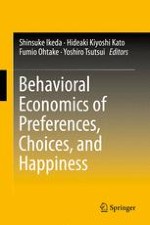2016 | OriginalPaper | Buchkapitel
15. Social Capital, Household Income, and Preferences for Income Redistribution
verfasst von : Eiji Yamamura
Erschienen in: Behavioral Economics of Preferences, Choices, and Happiness
Verlag: Springer Japan
Aktivieren Sie unsere intelligente Suche, um passende Fachinhalte oder Patente zu finden.
Wählen Sie Textabschnitte aus um mit Künstlicher Intelligenz passenden Patente zu finden. powered by
Markieren Sie Textabschnitte, um KI-gestützt weitere passende Inhalte zu finden. powered by
